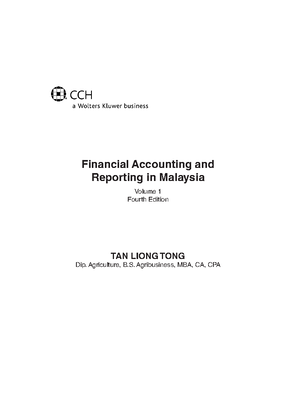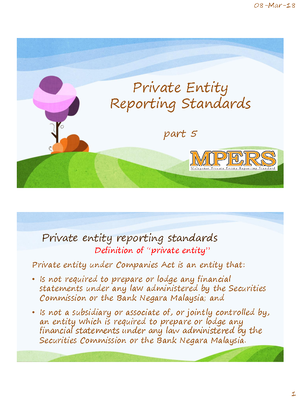- Information
- AI Chat
Was this document helpful?
Introduction to Auditing
Course: Auditing (AUD339)
402 Documents
Students shared 402 documents in this course
University: Universiti Teknologi MARA
Was this document helpful?

INTRODUCTION TO AUDITING
❖ Why audit is necessary?
The agency relationship between the owners (shareholders) of a company and the
management (board of directors) resulted in a conflict of interest (due to the information
asymmetry between them). The management might be biased in presenting the financial
information to the shareholders.
As such, the independent auditor plays an important role to safeguard the interest of the
shareholders by reducing information risk (the risk of misleading information in the financial
statements) through the issuance of an objective opinion (unbiased opinion) on the financial
statements prepared by the management.
ACCOUNTING
AUDITING
1)
Accountant is responsible for the maintenance of
accounting records and preparation of financial
statements.
Auditor is responsible for issuance of an
objective opinion on whether the recorded
information fairly reflects actual
transactions.
2)
Accountant is responsible to develop / design a
good internal control system to ensure that
transactions are properly recorded.
Auditor is responsible to evaluate the
system to determine its effectiveness.
3)
Accountant must understand accounting
principles so that transactions were recorded
according to the accepted standards.
Auditor must understand accounting
principles so that he/she would be able to
detect non-compliance by the Accountant to
the accounting standards.
4)
Accountant should possess expertise to record
transactions and to prepare financial statements.
Auditor should possess expertise to
accumulate and interpret audit evidence.
❖ Types of Audit:
1) Financial Statement Audit
• Purpose: To determine whether or not the financial statements reflect true and fair
view of the company’s financial performance and position and whether the
accounts were prepared based on approved reporting standards and provisions of
the Companies Act.
• Nature: Highly standardised.
• Always performed by External Auditor (Chartered Accountant)
“AN INDEPENDENT AUDITOR SHOULD DETERMINE AND ISSUE AN OBJECTIVE /
UNBIASED OPINION ON WHETHER THE FINANCIAL STATEMENTS REFLECT A
TRUE & FAIR VIEW OR NOT”
2) Operational Audit
• Purpose: To evaluate effectiveness and efficiency of operating
procedures/systems.
• Nature: Highly non-standardized and often subjective.
3) Compliance Audit
• Purpose: To determine whether specific procedures/rules & regulations were
being complied with (followed or not).
• Nature: Non-standardized but specific and usually objective.











![Chapter 1 Partnership, FAR 160 [Lecturer Notes]](https://d20ohkaloyme4g.cloudfront.net/img/document_thumbnails/1725fd64c6586cc441c660830d3a6800/thumb_300_388.png)








